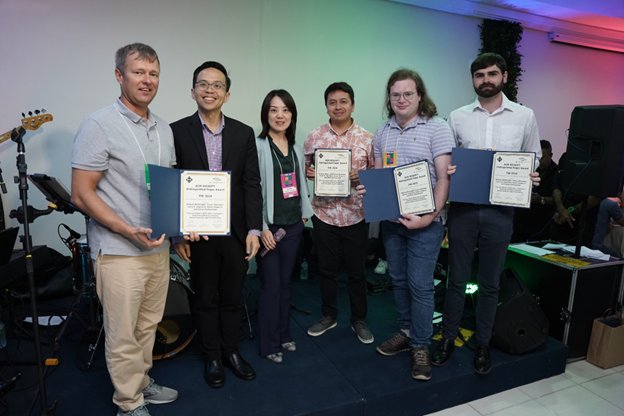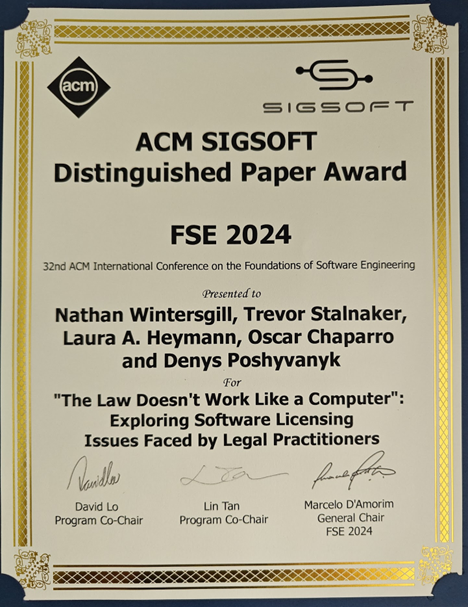CS and Law Researchers Win a Distinguished Paper Award at FSE’24

Computer Science PhD students Nathan Wintersgill and Trevor Stalnaker, along with their advisors and collaborators, have been honored with an ACM SIGSOFT Distinguished Paper Award at the prestigious ACM International Conference on the Foundations of Software Engineering (FSE 2024).
Their paper, "The Law Doesn’t Work Like a Computer: Exploring Software Licensing Issues Faced by Legal Practitioners," delves into the intricacies of open source software (OSS) license compliance, a critical area as modern software increasingly relies on OSS components.
Nathan and Trevor are co-advised by Assistant Professor Oscar Chaparro and Chancellor Professor Denys Poshyvanyk. They collaborated with Laura A. Heymann, the James G. Cutler Professor of Law at William & Mary Law School, to understand how license compliance in IT organizations is performed from the perspective of legal practitioners.
"Our goal was to understand the practical experiences of legal practitioners navigating OSS license compliance," said Wintersgill, the first author of the paper. "We discovered significant challenges in maintaining compliance, negotiating license changes, and interpreting OSS licenses, tasks that often lack clear guidance from U.S. courts."
The team conducted a study with 30 legal practitioners involving both a survey and follow-up interviews. They identified 14 key findings across three main areas: the general ecosystem of compliance, specific compliance practices, and the challenges faced by legal practitioners. One major finding is the need for robust compliance tools that minimize false positives and provide a thorough analysis to aid both developers and legal professionals.
"Current tools for license compliance are often inadequate," Wintersgill explained. "They can be difficult to use and provide limited analysis and answers, which complicates the compliance process for both developers and lawyers."
The research also highlights the importance of integrating compliance efforts throughout the software development lifecycle. "Compliance should be embedded in the development process from the very beginning," Wintersgill emphasized. "Proactive compliance measures lead to better outcomes and help prevent noncompliance issues from arising later."
Effective communication between developers and legal professionals emerged as a crucial factor in successful license compliance. The study suggests that continuous dialogue and educational resources can help bridge the gap, ensuring that developers understand the legal implications of their work.
"Legal compliance needs to be part of software engineering education," Wintersgill noted. "By incorporating legal training early in developers' careers, we can create a culture of compliance that benefits the entire software ecosystem."
The CS Department celebrates this significant achievement and the team's contributions to advancing the field of software engineering. Their work not only enhances our understanding of OSS license compliance but also serves as an example of the benefits of collaboration between software and legal scholars.















